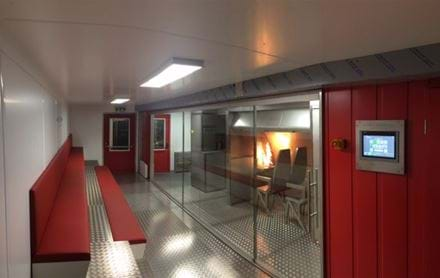PAL acquires state of the art Cabin Fire and Smoke Trainer
Flag carrier Philippine Airlines recently acquired a state-of-the-art Cabin Fire and Smoke Trainer (CFST) – a special structural equipment simulating inflight fire scenarios.
This $300,000 investment will enhance the capabilities, skills and knowledge of PAL cabin crew and pilots in dealing with emergency situations that may be encountered inflight. The CFST is a one-storey structure with an observation area and fire training area–made of high quality materials and designed to withstand the rigors of extensive usage. It is equipped with air-conditioning and heating to provide observers maximum comfort during training.
The fire training area mimics the layout of an actual aircraft cabin, based on a realistic cabin footprint with an aisle, galley, seats, overhead stowage bins and a lavatory where fire scenarios will be simulated and addressed through modern training methods. During the training proper, crew members will be asked to play various roles: as firefighter, communication channel between the crew and the cockpit/flight deck, and assisting firefighter.
“Philippine Airlines considers safety as a corner stone of its operations and is committed in providing all appropriate resources to support the management of safety,” PAL President and COO Jaime J. Bautista said. “The threat of an inflight fire is very rare because of the onboard safety systems in our aircraft. However, when it does occur, the best defense is for our flight and cabin crew to have a comprehensive knowledge of effective firefighting techniques.”
PAL VP for Safety Nelsie Fabila added, “We adopt a scenario-based training concept, so participants feel like they are in an actual emergency situation. This will adequately prepare them for any worst case scenario. To ensure a safe training environment, the fire trainor is equipped with a gas detection system, temperature sensors and emergency stops.”
All the fires in the fire trainor are fully automatic so when the instructor selects the command “fire”, the simulated fire starts automatically; and when he selects “stop”, the fire is extinguished.
This CFST is also environment-friendly using water-based compressed air to contain the fire instead of dry chemicals. The CFST is housed in the PAL grounds in Pasay City.
The airline also maintains an Airbus A320 simulator and a fully-equipped training center for its flight and cabin crew members and other operations personnel, in compliance with the strictest international aviation safety standards.
Robust safety investments are a vital part of the flag carrier’s efforts to earn five-star status as a globally competitive full-service airline.
